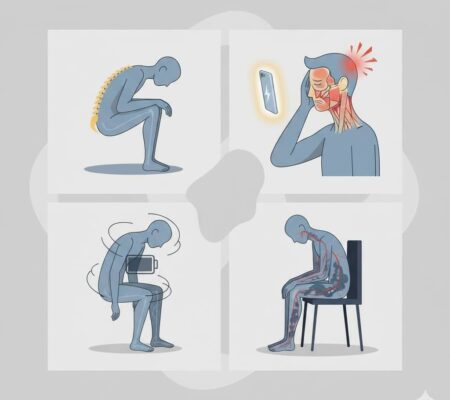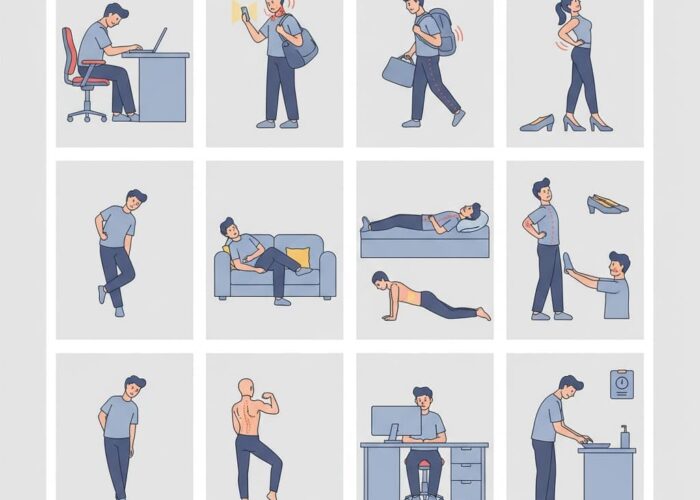Good posture is more than just standing tall—it plays a key role in your overall health, confidence, and energy levels. Yet, many of us develop everyday habits hurting posture without even realising it. From slouching at a desk to constantly checking phones, these bad posture habits gradually strain the spine and muscles, leading to discomfort and long-term issues.
The truth is, small posture mistakes to avoid can make a huge difference in preventing everyday posture problems. Common issues like “tech neck” are not just buzzwords—they’re real concerns that affect how your body feels and functions. Recognising the signs your daily habits are ruining posture is the first step toward change.
In this blog, we’ll uncover the common posture mistakes you’re making and share simple, practical poor posture solutions to keep your spine strong and healthy. And if bad posture has already started affecting your body, professional support such as posture correction physiotherapy can help correct alignment, strengthen weak muscles, and prevent further strain.
Why Posture Matters
Good posture is more than just sitting or standing up straight—it’s the foundation of a healthy body. When your spine is aligned properly, your muscles and joints work as they should, reducing unnecessary strain and making everyday movements easier.
Benefits of Good Posture
- Supports spinal health: A neutral spine helps prevent long-term back and neck problems.
- Reduces back pain: Sitting and standing correctly decreases pressure on your lower back.
- Improves breathing: Upright posture allows your lungs to expand fully, making it easier to take deep breaths.
- Boosts confidence: Standing tall often makes you look and feel more confident.
Problems Caused by Poor Posture
Ignoring posture can lead to several health concerns over time, such as:
- Slouching and rounded shoulders that affect appearance and body alignment.
- Headaches and neck pain from muscle tension and “tech neck.”
- Fatigue since poor posture makes your body work harder to stay balanced.
- Poor circulation caused by sitting or standing incorrectly for long periods.
By understanding the impact of posture on your health, you can see why it’s worth breaking small bad habits before they turn into long-term problems.

The 10 Everyday Habits That Could Be Hurting Your Posture

1. Sitting Too Long at Your Desk
Long hours at a desk can strain your spine, leading to slouched shoulders and a forward head tilt.
- Take short breaks to stretch or walk
- Use an ergonomic chair for support
Studies show 81% of Australian workers spend too much of their workday sitting, often in poor ergonomic setups.
2. Using Your Phone with “Tech Neck”
Looking down at your phone for hours puts stress on your neck and shoulders.
- Hold your phone at eye level
- Take regular screen breaks
3. Carrying Heavy Bags on One Shoulder
A heavy bag on one side creates imbalance in your spine and shoulders over time.
- Switch shoulders or use a backpack
- Carry only what you need
4. Poor Sleeping Positions
Sleeping on your stomach or with the wrong pillow can strain your neck and back.
- Sleep on your back or side
- Use pillows that keep your neck aligned
5. Wearing High Heels Too Often
High heels push your body forward, affecting your spine and hips in the long run.
- Limit heel use to short periods
- Stretch your calves regularly
6. Leaning on One Leg While Standing
Putting weight on one leg strains your hips and lower back, causing imbalance.
- Stand with weight evenly spread
- Keep both feet grounded
7. Slouching While Watching TV or Gaming
Soft couches and bad posture weaken your core and round your shoulders.
- Sit upright with back support
- Avoid long hours without moving
8. Skipping Exercise and Core Strengthening
Weak muscles don’t support your spine well, leading to stiffness and poor posture.
- Do light workouts like yoga or pilates
- Focus on core and back strength
9. Incorrect Desk Setup
A low or high monitor and poor chair height force your neck and back out of alignment.
- Keep screen at eye level
- Sit with feet flat and elbows at 90°
10. Not Paying Attention to Posture in Daily Life
Little habits like hunching while cooking or bending incorrectly add up.
- Do quick posture checks during the day
- Use reminders or apps for awareness
How to Fix These Bad posture Habits
1. Practice Regular Stretching
Daily stretching helps loosen tight muscles and reduce tension from long hours of sitting. Simple moves like chest openers or cat-cow stretches, often recommended in exercise physiology, can make a big difference.
- Stretch neck, shoulders, and back daily
- Focus on simple, gentle movements
2. Strengthen Core and Back Muscles
A strong core naturally supports your spine and improves posture. Light exercises like planks, bridges, or yoga are proven in exercise physiology to reduce slouching and improve stability.
- Build strength with core-focused workouts
- Improves balance and posture support
3 Set Up an Ergonomic Workspace
An ergonomic setup ensures your body stays aligned while working. Adjust your chair, monitor, and desk to reduce unnecessary strain on your spine.
- Keep monitor at eye level and feet flat
- Use a chair with lumbar support
4. Take Movement Breaks
Long sitting sessions cause stiffness. Standing up and moving every 30–60 minutes improves circulation, which experts in exercise physiology link to better posture and reduced fatigue.
- Stand, stretch, or walk regularly
- Add light desk exercises for mobility
5. Be Mindful of Your Posture
Awareness is key to fixing posture. Quick self-checks or using phone reminders can help you stay upright and aligned throughout the day.
- Do regular “posture checks”
- Use apps or smartwatch reminders
6. Choose Supportive Sleep Habits
Your sleeping position affects your spine too. A medium-firm mattress and the right pillow can keep your neck and back aligned while you rest.
- Prefer side or back sleeping
- Choose pillows that support your neck
7. Make Smart Lifestyle Choices
Little changes go a long way. Comfortable shoes, balanced bags, and staying active daily can help protect your posture and support overall exercise physiology goals.
- Limit high heel use and carry bags evenly
- Stay active with walking and stretching
Conclusion
Good posture is more than just standing tall—it’s the backbone of your health, energy and confidence. In Sydney’s busy office spaces, on the commute or at home, those everyday habits we don’t even notice are quietly undermining our spine and strength. At The Movement Mill, our experienced physiotherapy team specialises in posture correction for Sydney professionals and active adults.
Don’t wait until the discomfort becomes pain, fatigue becomes a constant, or your posture starts costing you productivity and wellbeing. Contact The Movement Mill Sydney today and book a posture assessment with our expert physiotherapists. Let us help you restore alignment, strength and confidence so you can move, work and live better—starting now.
Book your appointment today and take your first step toward a healthier you.
FAQs
What causes bad posture in everyday life?
Poor posture often develops from daily habits like sitting too long at a desk, using phones with your head tilted down (“tech neck”), carrying heavy bags on one shoulder, or having a poorly set-up workspace. Over time, these habits strain your spine and muscles, leading to neck, shoulder, and back pain.
Can physiotherapy help correct poor posture?
Yes — posture physiotherapy at The Movement Mill in Sydney is one of the most effective ways to fix bad posture. Our physiotherapists assess your spine, identify muscle imbalances, and design a tailored program with strengthening, stretching, and ergonomic training to restore proper alignment.
How long does it take to improve posture with physiotherapy?
Most people notice visible improvements within 4–8 weeks, depending on posture severity and consistency with exercises. With regular posture training and physiotherapy sessions at The Movement Mill, your muscles adapt faster, helping you maintain better alignment throughout the day
Can bad posture cause pain or other health problems?
Absolutely. Poor posture can lead to neck pain, back stiffness, tension headaches, shoulder tightness, and fatigue. It can even affect breathing and circulation. Early assessment by a posture physiotherapist in Sydney can prevent these problems from worsening.
How can I improve my posture naturally at home?
Simple daily habits can make a big difference:
-
Take short breaks from sitting every 30–60 minutes
-
Set up an ergonomic workspace
-
Strengthen your core and back muscles
-
Sleep on a supportive mattress and pillow
-
Stay mindful of your sitting and standing posture
For personalised guidance, visit The Movement Mill’s posture physiotherapists in Sydney for expert advice and exercise programs tailored to your lifestyle.

